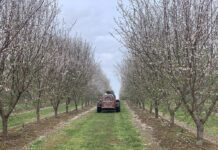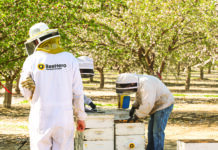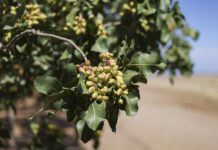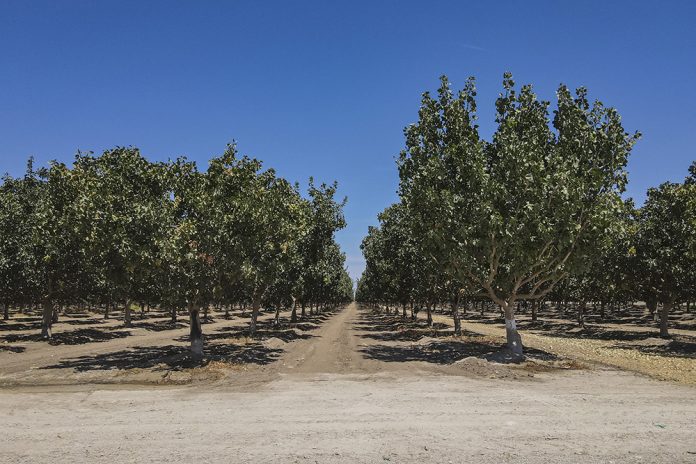
If you are considering selling your nut ranch or orchard, first take a good look at its appearance and then make all necessary improvements.
“First impression is very important,” said Nick Wallander, agent with Stromer Realty Company of California, who estimates that appearance may only be 20% to 30% of what determines a sale, “but it’s the main factor you can change.”
He recommends a seller make sure all trees on the property are trimmed properly and that any broken sprinklers are repaired.
“Make sure the water pump is working and that your wells are in operation,” he said. “If not, get them replaced or get them repaired.”
“If a property doesn’t look like it’s been taken care of, buyers wonder, ‘What else have they scrimped on?,’” said Scott Schuil, vice president/principal/agent with Schuil Ag Real Estate. “A clean orchard is important. Mow weeds and clean up, especially if you have graffiti, trash or chemical containers on your property. There should be no furniture outside, and if people are dumping on your property, clean that up.”
owever, it is possible to overspend on improving the appearance of your orchard, noted Schuil. Some sellers spend too much money on things like gravel roads or “a nice sign.”
Main Factors in a Sale
The two biggest factors that drive sales are production and the amount of available water, according to Schuil. The security of surface water should be from “a very reliable source,” and there should be a second source such as an irrigation district.
The main factor in selling a nut ranch or orchard is the kind of nuts it grows, said Wallander, “but you can’t switch trees out that quickly.”
He also ranked water as the second most important factor, echoing Schuil that buyers prefer properties with a “dual source” for water such as good wells and being part of a water district as a backup source.
“It’s insurance in a lot of farmers’ eyes,” said Wallander. “If you don’t have good water, you’re not going to have a good crop.”
A ranch “absolutely” needs to be active to maintain its value, according to Schuil.
“Value of a property is very much based on production, and production is directly related to the care and inputs provided to the orchard,” he explained. “In permanent plantings like almonds and walnuts, it is vitally important that the orchards are actively farmed and follow best agricultural farming and production practices to maintain their value. If almond and walnut orchards are not tended to and severely decline, the chances of rehabbing them and bringing them back to a full production position are extremely low.”
He noted, however, that pistachios “are a bit hardier and can withstand more stresses, making their chances of a rehab more likely.”
Paperwork
“Production and water are two key elements behind the sale or purchase of nearly all agricultural properties,” said Schuil. “In the case of production, it’s important to have production records from the processor to verify the orchard’s productivity. It also breaks down not only variety, but grades, sizing and quality, which are all key components to the production and profitability of an orchard.
“As for water reports, we like to secure a 10-year historical delivery of surface water from the irrigation district associated with the property,” he continued. “If the property is in a lesser-known irrigation district, we typically recommend a third-party water supply analysis be conducted to provide buyers with the confidence in a water supply to move forward with a purchase.”
Schuil also advises sellers to keep bills of expenses, such as water, spraying and employee costs, “to get reimbursed properly.” If your ranch is organic, make sure all organic certification is up to date.
Buyers will need to see your production records to know what blocks you have on your property, which ones are younger or older and what nuts they produce, said Wallander. Your paperwork should include information on tree health, showing that your trees have all the proper minerals and fertilizers.
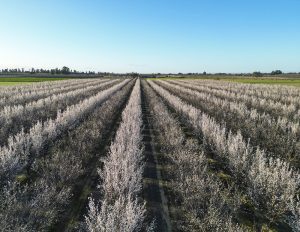
Houses on the Property
Wallander, who is based in Yuba City in Northern California where buyers may want to leave a career in the San Francisco Bay Area to live on their own nut ranch, advises sellers to make necessary improvements to the appearance of any houses on the property.
“Make sure it has fresh paint, mow the lawn and pull the weeds,” he said, adding buyers often want to make sure that any house has a strong foundation to work on. “Buyers don’t want to worry if the roof leaks.”
“Typically, houses have minimal value in the properties we sell,” said Schuil, who is based in Visalia in California’s Central Valley where most buyers are large growers looking to expand production. “Sometimes the house could be a benefit; sometimes it could be a negative.
“Each buyer is unique,” he continued. “Typically, they want the property vacated so they can tear the house down or keep it vacant.”
He estimates 90% of his clients prefer no residential dwellings on the property.
“You are a farmer, not a property manager,” he said. “Tenants will have many different issues.”
He noted that owners’ houses are more popular on nut ranches in Northern California, but if a nut orchard “is above 20 acres, it’s hard to put value on a house.”
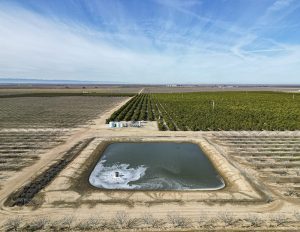
Equipment and Employees
“Having the equipment included is definitely a plus,” said Wallander, based on the Northern California market that includes many buyers new to nut ranching.
“Most of the time, it’s better not to include the equipment in the property sale,” said Schuil. “We do understand there are some depreciation benefits to purchasing the equipment with the property, however, we always recommend buyers consult with tax accounting professionals to advise them on what is best for each unique situation.”
Having good employees can help influence a sale, according to Wallander, who explained that you may have had a dozen or more people work for you, but “having those two employees that you can definitely vouch for can be helpful for buyers who didn’t grow up in farming.”
Maintaining employees after a sale depends on the size of the orchard, according to Schuil. It can also be important if something on the property requires special training, such as a complex irrigation system.
When to Sell
The best time of year to sell an almond ranch is springtime, according to Wallander, “especially when you’ve had some rain. You should list in early spring when the almonds bloom or later in spring when walnuts leaf out.”
The worst time to sell is harvest, he added, because the work requires your employees’ attention and “they don’t care” about anything else. “The holidays are another slow time for sales.”
“It’s always a good time to sell,” said Schuil. “There really is no right or wrong time to sell your almond orchard. If you’re thinking of selling, my advice is that you keep an excellent record of all cultural costs associated with your orchard. When you’re ready to list your orchard, you can clearly identify terms that outline your reimbursement of these costs. The reimbursement of cultural costs and who retains the profits from the crop are always negotiable.”
He added that even holiday season can be a good time to sell your orchard. Many buyers are looking to buy at the end of the year for tax purposes.
Mistakes to Avoid
The main mistake sellers make is “being unrealistic,” according to Wallander. “The market is not as good as it was two years ago. They’re not going to get those prices.
“Working with a reputable agent is good,” he added. “They can tell you the value of your property.”
Many brokers, including Stromer Realty, offer an “opinion of value,” which is like an appraisal but does not require a license. Some offer this service for free. This document incorporates factors such as recent comparable sales prices.
“We understand the prices in certain areas and can give the seller an idea of what the price should be,” said Wallander. “List with a reputable agent and listen to them, and don’t have preconceived ideas. It’s very rare to get top dollar despite those top dollar stories.”
Another big mistake that sellers make is not being able to provide important paperwork such as production records, said Schuil. “Nobody’s going to buy a farm without seeing production records.”







